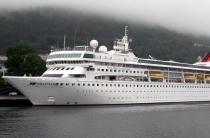Baltiysk-Kaliningrad (Russia)
Cruise Port schedule, live map, terminals, news
Region
Baltic - Norwegian Fjords - Russia
Local Time
2025-01-03 04:42
 33°F
33°F 0.8°C

 Fresh breeze
Fresh breeze10.2 m/s
 38 °F / 4 °C
38 °F / 4 °C 31 °F / -0 °C
Baltiysk is a Russian port town (known as Pillau / Piliava prior to 1946) with population around 33,000. It is located on the northern part of Vistula Spit (a peninsular stretch of land). Baltiysk is Russia's westernmost town, also major naval base and ferry port on the Baltic Sea route to St Petersburg. Baltiysk (Kaliningrad) and Sankt Petersburg are Russia's only Baltic Sea ports free of ice the whole year-round.
During WW2 (1939-1945), the German port town Pillau had a U-boat training facility. Here on April 16, 1945, by artillery fire, the Russians sunk a U-78 submarine docked near the pier. This was the war's only case of a submarine being sunk by land-based forces. As the Soviet army entered East Prussia, over 450,000 citizens from Pillau were evacuated (ferried) to other ports in Germany. The town was captured on April 25, 1945.
After the war, the town's remaining German inhabitants were expelled. In 1946, its name was changed from Pillau to Baltiysk. In 1952, there was inaugurated a Soviet Navy base. As a result, the town was closed for foreigners and accessible by permits only.
Kaliningrad (fka Konigsberg) is a Russian port city on the Baltic Sea, as well as the administrative center of the Russian territory Kaliningrad Oblast (located between Lithuania and Poland). The city has a population of around 430,000. As the East Prussian province's capital, Konigsberg was founded in 1255 and named in honor of King Ottokar II. During WW2, Konigsberg was heavily bombed and damaged by the British in 1944. At the end of the war, it became part of the USSR (Soviet Union). In 1946 was renamed Kaliningrad (after Mikhail Kalinin). In the period 1946-49, the German population was expelled, the city was repopulated with USSR citizens and rebuilt.
In July 2007, Russia declared that if NATO missile systems were deployed in Poland, then Russian nuclear weapons might be deployed in Kaliningrad.
Among Kaliningrad's most popular tourist attractions are museums (Immanuel Kant /on Kneiphof island, History and Arts, Amber Museum, State Art Gallery, World's Oceans), churches, the city gates, Kaliningrad Zoo (since 1896, with 315 species and thousands of individual animals), Lower Pond (man-made lake and recreation park), Upper Pond. There is an anchored U-boat (B-413) hosting a permanent exhibit about Russia's submarine fleet. The city's oldest building is Juditten Church (built 1288).
Kaliningrad has its own brands of vodka (Stari Konigsberg) and beer (Ostmark).
The city has many restaurants offering traditional East Prussian specialties, as well as seafood dishes, pizzas, sushi.
Baltiysk-Kaliningrad cruise terminal
Cruise ships to Kaliningrad dock at the Baltiysk port. Their passengers are then transported to the city via charter buses.
- Kaliningrad is served by the Khrabrovo Airport connecting it to other Russian territories, as well as to some European cities.
- From Baltiysk there is a regular ferry service to St Petersburg Russia, Stockholm Sweden, Copenhagen Denmark, Riga Latvia, and Kiel Germany.
- The Kaliningrad Passazhirsky railway station connects the city to Moscow, St Petersburg, Adler, and Chelyabinsk.
- Regional trains from Kaliningrad-North (on Victory Square, in the city centre) depart to the local Russian towns (in Kaliningrad Oblast) Sovetsk, Svetlogorsk, and Zelenogradsk.
- Cruise Industry

Fred Olsen's Prussia-themed Braemar ship cruise in August 2022
Fred Olsen Cruise Line's MS Braemar ship is scheduled to depart on a 10-night culture-themed itinerary to the lost lands of Prussia in August 2022...
December 12, 2020 - Accidents

Ferry Stranded in Baltic Sea with 335 People Onboard
Almost 300 ferry passengers have been stranded after an engine breakdown in Baltic Sea. The ship sent out a distress call following a reported...
October 2, 2018 - show more news
